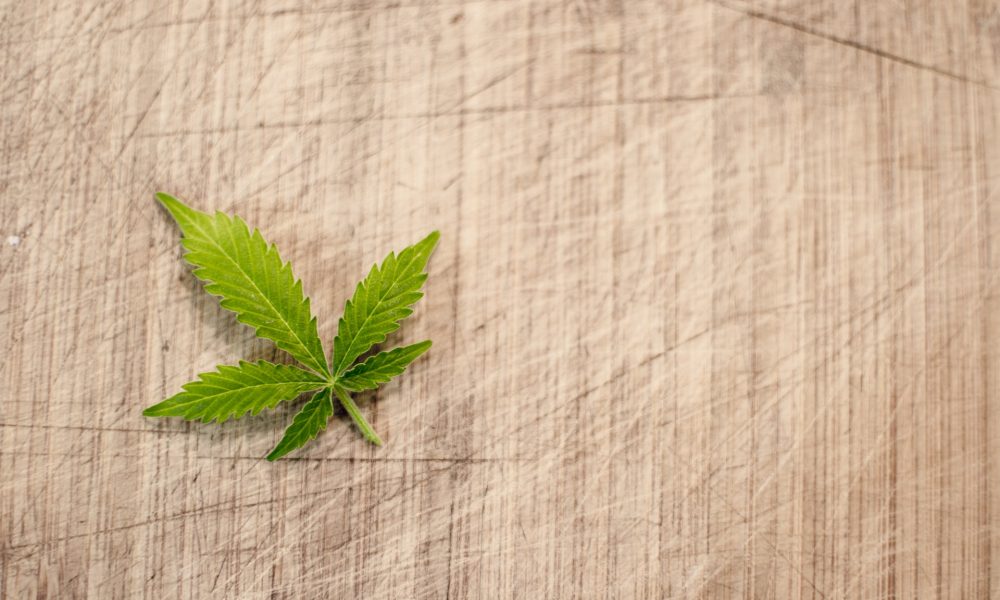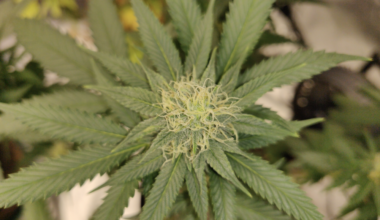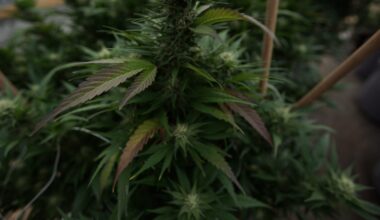Maryland senators on Monday signaled that they may follow the House’s lead by putting the issue of marijuana legalization on the state’s November ballot and delay creating comprehensive regulations for the market until next year after voters make their decision.
Monday’s hearing before the Senate Finance Committee was a whirlwind. There were three marijuana reform bills on the agenda: two from Del. Luke Clippinger (D) that already passed the House and another from Sen. Brian Feldman (D).
But rather than tackle each proposal one-by-one, members discussed possible revisions to the Senate bill to more closely align it with one of Clippinger’s bills on setting preliminary rules if voters approve legalization at the ballot.
As drafted, Feldman’s SB 833 would have not only placed legalization on the ballot but also prescribed specific regulations for the would-be market, setting tax rates on marijuana products and creating licensing policies, for example.
In committee, that language was largely scrapped in a proposed revised version—replaced with most of the provisions of the House-passed HB 837, which largely focuses on topics such as penalties and expungements. With the changes, the modified Senate bill would leave it up to legislators to develop a more comprehensive regulatory framework if the other House bill, HB 1, is enacted and voters approve the resulting ballot referendum.
The newly proposed version of SB 833 would also incorporate provisions of other cannabis legislation that’s been introduced this session, such as the creation of a community reinvestment fund and the allowance of state tax deductions for certain cannabis-related expenses that marijuana businesses are barred from claiming under current federal tax code.
—
Marijuana Moment is already tracking more than 1,000 cannabis, psychedelics and drug policy bills in state legislatures and Congress this year. Patreon supporters pledging at least $25/month get access to our interactive maps, charts and hearing calendar so they don’t miss any developments.![]()
Learn more about our marijuana bill tracker and become a supporter on Patreon to get access.
—
“The priority here is to get rid of mass incarceration of folks for non-violent small possessions of cannabis. That’s the priority with input from the voters of Maryland,” Feldman said at the hearing. “Beyond that, [the goal is to lay out] some foundation for for next year, tackling…more complicated issues dealing with licensing” and more.
As introduced, SB 833 would have both put legalization on the ballot and created regulations for the market if passed by voters. The ballot portion of the legislation was removed in the revised bill discussed in committee. If it advances with the changes, it appears that it would be incumbent on the legislature to also pass Clippinger’s HB 1 in order for those rules to take effect.
The Senate panel only briefly touched on HB 1, which would ask voters to approve an amendment to the state’s constitution to legalize cannabis use and possession by adults at least 21 years old. The committee is expected to hold further discussions and votes on the marijuana proposals on Tuesday.
HB 1 would direct lawmakers to set laws to “provide for the use, distribution, regulation, and taxation of cannabis within the state.” It would further direct lawmakers to set laws to “provide for the use, distribution, regulation, and taxation of cannabis within the state.”
As noted, Clippinger’s HB 837 was designed to set up initial rules for a legal marijuana market if voters approve the policy change. It was discussed in the Senate Finance Committee last week along with HB 1.
Much of the language from HB 837 appears positioned to be incorporated into SB 833, according to the discussion draft shared with Marijuana Moment.
It specifies that the purchase and possession of up to 1.5 ounces of cannabis would be legal for adults, and it would remove criminal penalties for possession of up to 2.5 ounces. Adults 21 and older would be allowed to grow up to two plants for personal use and gift cannabis without remuneration.
Past convictions for conduct made legal under the proposed law would be automatically expunged, and people currently serving time for such offenses would be eligible for resentencing. The legislation makes it so people with convictions for possession with intent to distribute can now petition the courts for expungement three years after serving out their time.
It would further establish a Cannabis Business Assistance Fund to support equity initiatives for minority- and women-owned businesses. That fund would go toward incubator and educational programs to promote participation in the industry by people most impacted by criminalization.
To understand the effects of legalization on the state and its residents, the statutory bill would also establish various research initiatives, including studies into youth impacts, use patterns, impaired driving, advertising, labeling, quality control of products and barriers to entering the industry. A baseline study would be conducted before legalization, and updates would be sent to the governor every two months.
If voters approve legalization in November, it wouldn’t take effect immediately. Possession of small amounts of cannabis would become a civil offense on January 1, 2023, punishable by a $100 fine for up to 1.5 ounces, or $250 for more than 1.5 ounces and up to 2.5 ounces. Legalization for up to 1.5 ounces wouldn’t kick in for another six months.
Advocates have taken issue with that drawn-out timeline. It was one of several asks that they’ve made to the body, only some of which were incorporated in the proposed revision of SB 833. Activists also wanted lawmakers to include a provision preventing police from using the odor of marijuana alone as the basis for a search, for example, and that wasn’t included.
Another potential problem that advocates have identified is the proposed allocation of equity funds. The version discussed in committee would provide that certain funding for jurisdictions with the most cannabis arrests; and while black people are more likely to face criminalization over cannabis on average, some of the counties in Maryland where marijuana arrests have been most common are mostly white, potentially undermining the intent of the reform provision.
“We’re encouraged by the Senate Finance committee’s work to ensure cannabis legalization crosses the finish line this year,” Olivia Naugle, a legislative analyst with the Marijuana Policy Project, told Marijuana Moment. “We’ve advocated strongly all session that in order to further reduce police interactions and citations, the companion legislation should legalize possession and home cultivation immediately when the election is certified without delay.”
“Explicitly including that the odor of cannabis alone cannot be grounds for a search is also essential to further reduce police interactions for cannabis,” she said. “We hope the committee will consider these recommendations in a final product.”
Clippinger and other lawmakers had indicated that they wanted to tackle comprehensive regulations for an adult-use marijuana market next year after voters weigh in on the issue at the ballot, but certain senators, including Senate President Bill Ferguson (D), have expressed skepticism.
Ferguson said last year that he favored legalizing cannabis through the legislature rather than waiting to ask voters on November’s ballot. This month, however, he expressed openness to the referendum idea, but stressed that voters deserve to know more details of what a legal cannabis market would look like than is provided in the House bills.
As introduced, Feldman’s 83-page bill would have allowed home cultivation of up to four plants per adult, with a maximum of eight plants per residence. It would have also packaged the constitutional amendment and basic regulatory framework in a single piece of legislation, unlike Clippinger’s bifurcated package.
The senator’s bill as filed was considered at a Finance Committee hearing earlier this month, along with a separate Senate measure, SB 692, from Sen. Jill Carter (D).
A competing legalization bill on the House side, HB 1342, was introduced last month by Del. Gabriel Acevero (D). It had a brief committee hearing on March 8.
More than two dozen advocacy groups—including ACLU of Maryland, NAACP Maryland State Conference, League of Women Voters of Maryland and Maryland Office of the Public Defender—sent a letter to Maryland legislative leaders this month demanding that racial and socioeconomic equity be placed at the forefront of any attempts to legalize marijuana in the state.
A recently released poll of Maryland voters from ACLU found that 66 percent are more likely to support marijuana legalization if it includes relief for past convictions; 65 percent are more likely to back it if the reform stops police from using the odor of cannabis as probable cause for a search and 61 percent are more likely to be on board with legislation if marijuana can’t be used to deny housing or child custody or negatively impact parole or probation status.
Maryland lawmakers are also considering separate legislation this year to decriminalize drug possession and fund access to psychedelics for therapeutic uses.
When it comes to marijuana, legalization began to advance through Maryland’s legislature last session, but no votes were ultimately held. The Senate Finance Committee held a hearing last March on a legalization bill sponsored by Feldman and Ferguson. That followed a House Judiciary Committee hearing on a separate cannabis proposal in February.
Lawmakers then worked to reconcile the differences between the House and Senate proposals in hopes of getting something to the desk of Gov. Larry Hogan (R). Hogan has not endorsed legalization but has signaled he may be open to considering the idea.
A poll in October found that the state’s residents are on board with the policy change. Two-thirds (67 percent) of Marylanders now back legalizing cannabis, according to a Goucher College survey. Just 28 percent are opposed.
Maryland legalized medical marijuana through an act of the legislature in 2012. Two years later, a decriminalization law took effect that replaced criminal penalties for possession of less than 10 grams with a civil fine of $100 to $500. Since then, however, a number of efforts to further marijuana reform have fallen short.
A bill to expand the decriminalization possession threshold to an ounce passed the House in 2020 but was never taken up in the Senate.
Also that year, the governor vetoed a bill that would have shielded people with low-level cannabis convictions from having their records publicized on a state database. In a veto statement, he said it was because lawmakers failed to pass a separate, non-cannabis measure aimed at addressing violent crime.
In 2017, Hogan declined to respond to a question about whether voters should be able to decide the issue, but by mid-2018 he had signed a bill to expand the state’s medical marijuana system and said full legalization was worth considering: “At this point, I think it’s worth taking a look at,” he said at the time.
As for Maryland lawmakers, a House committee in 2019 held hearings on two bills that would have legalized marijuana. While those proposals didn’t pass, they encouraged many hesitant lawmakers to begin seriously considering the change.
Read the text of the discussion draft of the Senate marijuana bill that the committee discussed below:
Photo courtesy of Mike Latimer.
Medical Disclaimer:
The information provided in these blog posts is intended for general informational and educational purposes only. It is not a substitute for professional medical advice, diagnosis, or treatment. Always seek the advice of your physician or other qualified healthcare provider with any questions you may have regarding a medical condition. The use of any information provided in these blog posts is solely at your own risk. The authors and the website do not recommend or endorse any specific products, treatments, or procedures mentioned. Reliance on any information in these blog posts is solely at your own discretion.







